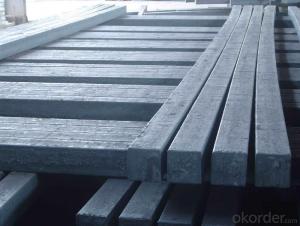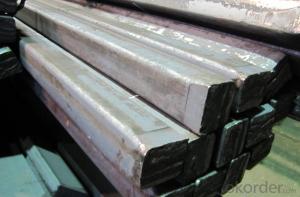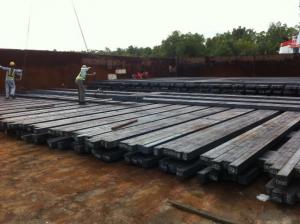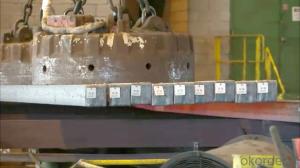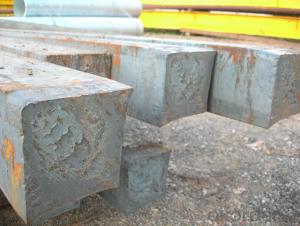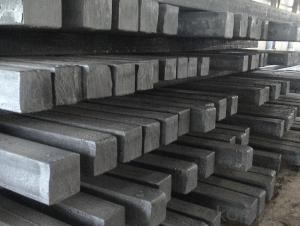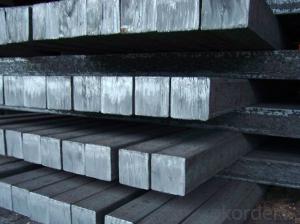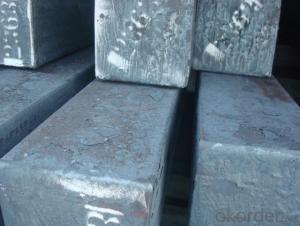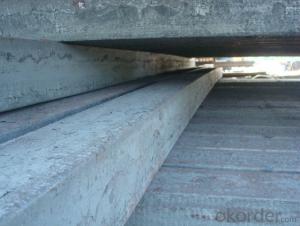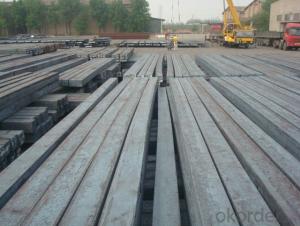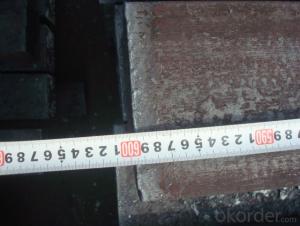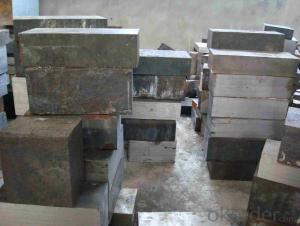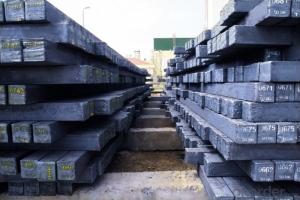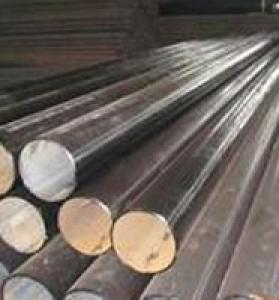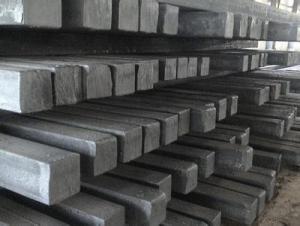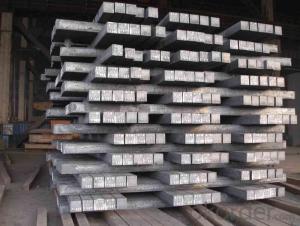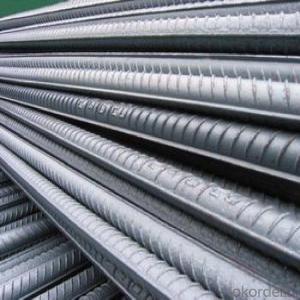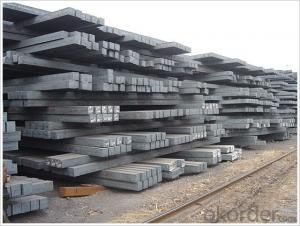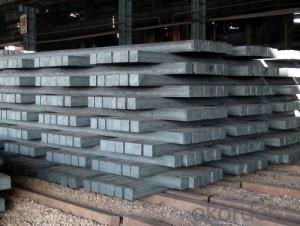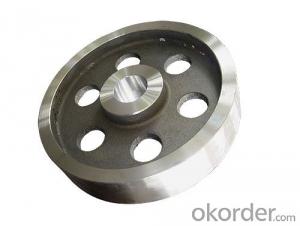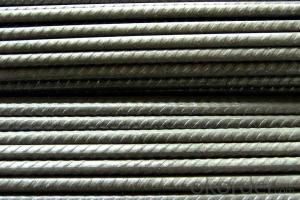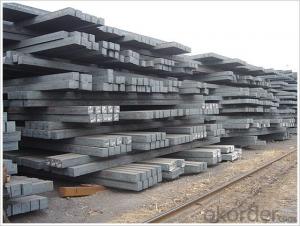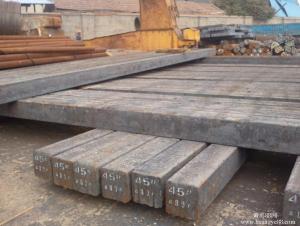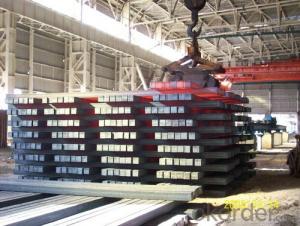Prime square alloy steel billet 155mm Q235
- Loading Port:
- Shanghai
- Payment Terms:
- TT OR LC
- Min Order Qty:
- 100 m.t.
- Supply Capability:
- 10000 m.t./month
OKorder Service Pledge
OKorder Financial Service
You Might Also Like
Structure of Prime square alloy steel billet 155mm Q235
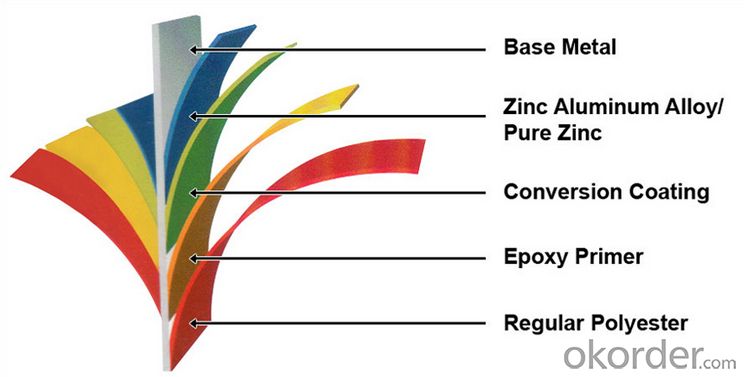
Description of Prime square alloy steel billet 155mm Q235
1) Excellent corrosion resistance: The zinc layer provides a good protection of Pre-painted Galvanizeed Steel Sheet.
2) High heat resistance: The reflective surface of the material aids in efficiently reflecting the sunlight away and in turn reducing the amount of heat transmitted. The thermal reflectivity converts into energy savings.
3) Aesthetics: Pre-Painted Galvanized steel sheet is available in plethora of patterns and multiple sizes as per the requirements that given by our customers.
4) Versatility: can be used in the various areas.
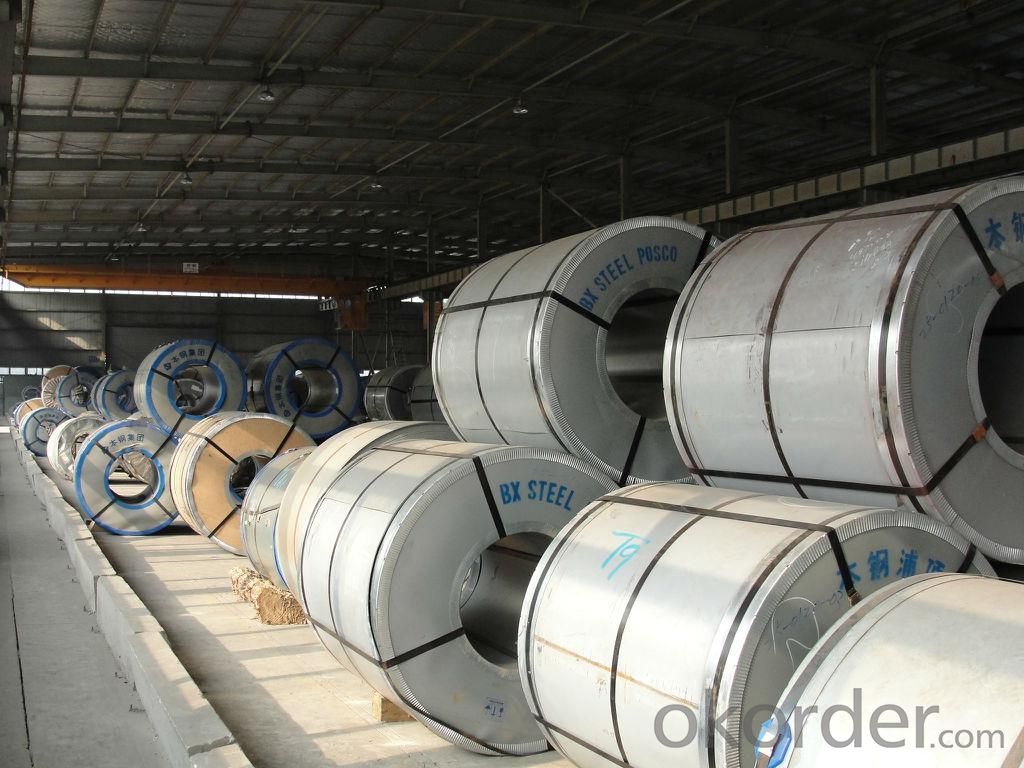
Main Feature of Prime square alloy steel billet 155mm Q235
Uncoated CR steel sheet
With the features of in line with the international highest standards in demension and shape, excellent surface finish and properties, the products are mainly used in home appliance and automobile industries.
Galvanized steel sheet(include HDG and EG)
With the features of good corrosion resistance, the products are mainly used in automobile, home appliance, electronics, building and machinery manufacture industries, etc.
Precoated steel sheet
With the features of enviromental protection and good processablility, long lasting surface durability, rich in colors, the products are maily used in building, home appliance and furniture industries, etc.
Applications of Prime square alloy steel billet 155mm Q235
1) Excellent corrosion resistance: The zinc layer provides a good protection of Pre-painted Galvanizeed Steel Sheet.
2) High heat resistance: The reflective surface of the material aids in efficiently reflecting the sunlight away and in turn reducing the amount of heat transmitted. The thermal reflectivity converts into energy savings.
3) Aesthetics: Pre-Painted Galvanized steel sheet is available in plethora of patterns and multiple sizes as per the requirements that given by our customers.
4) Versatility: can be used in the various areas.
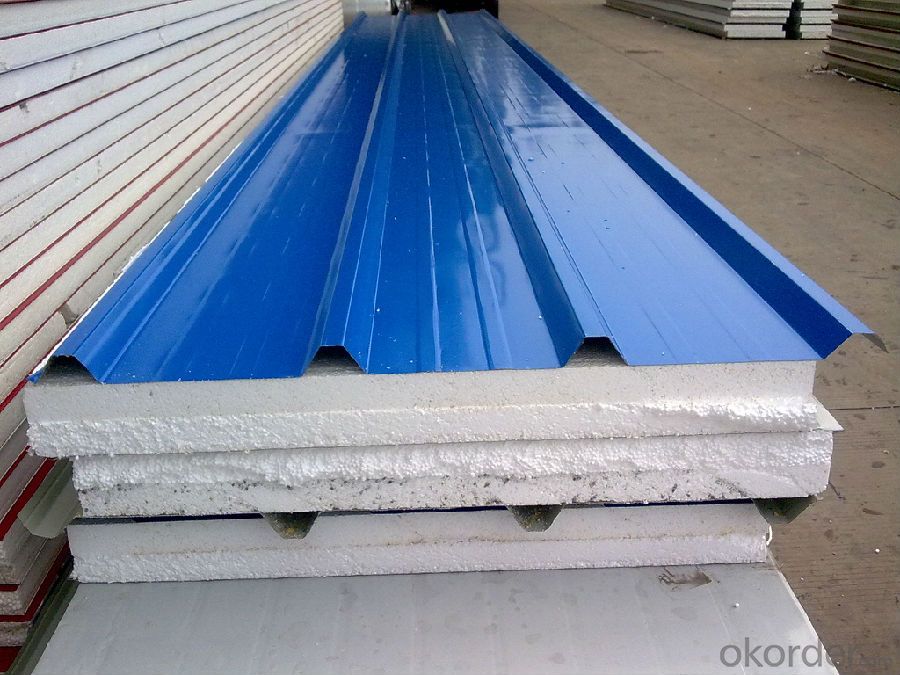
Specifications of Prime square alloy steel billet 155mm Q235
Product | Billet |
Material Grade | SGCC / SGCH / DX51D+AZ, etc |
Thickness | 0.6-3.0mm |
Width | 500-1500mm |
Tolerance | Thickness: +/-0.02mm , Width:+/-2mm |
Zinc-coating | Z30-150g/m2 |
Technique | Raw material: Hot rolled steel coil --> Cold rolled_>hot dipped galvalume |
Surface | Dried, Chromated, Unoiled |
Spangle | Regular spangle , small spangle, zero spangle |
ID | 508MM 610MM |
Coil weight | 1-25MT |
Export package | Cardboard inner sleeves, Waterproof paper, galvanized steel covered and steel strip packed |
FAQ of Prime square alloy steel billet 155mm Q235
We have organized several common questions for our clients,may help you sincerely:
1. How Can I Visit There?
Our company is located in Tianjin City, China, near Beijing. You can fly to Tianjin Airport Directly. All our clients, from home or aboard, are warmly welcome to visit us!
2. How Can I Get Some Sample?
We are honored to offer you sample.
3. Why choose CNBM?
we always fix steel produce in container well to make it safe arrive at destination port
we always provide best and professional forward service for our buyer
we always apply 14days free detention for our buyers container in destination
we provide one set After-sales service for our buyer
we provide China inland steel market price report
we help our buyer become number one in local market .
- Q:How are steel billets labeled for identification purposes?
- Steel billets are typically labeled for identification purposes through various methods such as stamping or tagging, where important information such as size, grade, heat number, and production date are marked directly on the billet or attached to it. This labeling allows for easy traceability and identification throughout the manufacturing and supply chain processes.
- Q:What are the different methods of steel billet surface cleaning?
- There are several methods of steel billet surface cleaning, including shot blasting, pickling, acid cleaning, mechanical cleaning, and electrochemical cleaning.
- Q:How are steel billets used in the production of sheet metal?
- Steel billets are heated and then rolled into thin sheets to create sheet metal. This process involves passing the billets through a series of rollers, which gradually reduce their thickness. These sheets can then be further processed and shaped to create various products, such as car bodies, appliances, and construction materials.
- Q:What is the role of steel billets in the manufacturing of agricultural machinery?
- The manufacturing process of agricultural machinery relies heavily on steel billets, which are semi-finished steel products cast into a rectangular shape. These billets serve as the raw material for various components and parts. The utilization of steel billets presents numerous advantages in the production of agricultural machinery. Firstly, steel's exceptional strength and durability make it an ideal material for heavy-duty machinery that operates under harsh conditions. By starting the manufacturing process with steel billets, the final products acquire the necessary strength and durability to withstand the demands of agricultural activities. Moreover, steel billets offer versatility in design and fabrication. Agricultural machinery requires components of different shapes and sizes, and steel billets can be easily molded and machined to meet these requirements. This flexibility allows manufacturers to produce complex parts that are crucial for the efficient operation of agricultural machinery. Additionally, steel billets ensure consistent and reliable quality. The manufacturing process of steel billets adheres to strict quality control measures, ensuring uniformity and compliance with industry standards. This consistency in quality translates into reliable performance and longevity of agricultural machinery, reducing the need for frequent repairs or replacements. Furthermore, steel billets possess excellent resistance to corrosion and wear, which is vital for agricultural machinery exposed to various environmental elements. Using steel billets guarantees that the final products can endure exposure to moisture, chemicals, and abrasive materials commonly encountered in agricultural settings. To sum up, the strength, durability, versatility, consistent quality, and resistance to corrosion and wear make steel billets indispensable in the manufacturing of agricultural machinery. By employing steel billets as the raw material, manufacturers can produce agricultural machinery that meets the demanding requirements of the industry, ensuring reliable and efficient performance in various farming applications.
- Q:What are the different heat treatment processes for alloy steel billets?
- There are several different heat treatment processes that can be used for alloy steel billets, depending on the desired properties and intended application of the material. Some of the most common heat treatment processes for alloy steel billets include: 1. Annealing: This process involves heating the billets to a specific temperature and then slowly cooling them, usually in a furnace. Annealing helps to relieve internal stresses and improve the machinability of the alloy steel. 2. Normalizing: Normalizing is similar to annealing, but the cooling process is done in still air instead of a furnace. This process helps to refine the grain structure of the alloy steel and improve its mechanical properties, such as strength and hardness. 3. Quenching and tempering: Quenching involves rapidly cooling the heated alloy steel in a liquid medium, such as oil or water, to achieve high hardness and strength. After quenching, the billets are then tempered by reheating them to a lower temperature, which helps to reduce the brittleness and improve toughness. 4. Precipitation hardening: This process is commonly used for alloy steels that contain elements such as aluminum, copper, or titanium. Precipitation hardening involves a series of heat treatments that cause the alloying elements to form fine particles within the steel, resulting in improved strength and hardness. 5. Case hardening: Case hardening is a surface heat treatment process that is used to increase the hardness of the outer layer of the alloy steel billets. This is achieved by heating the billets in the presence of a carbon-rich atmosphere or by applying a carbon-rich compound to the surface, followed by quenching and tempering. These are just a few of the many heat treatment processes that can be used for alloy steel billets. The specific process chosen will depend on factors such as the alloy composition, desired properties, and intended application of the material. It is important to carefully consider these factors and consult with heat treatment experts to ensure the desired results are achieved.
- Q:How are steel billets used in the production of automotive frames?
- Steel billets are used in the production of automotive frames as they are heated and shaped into desired forms, such as beams or plates, which are then welded together to create the structural framework of a vehicle.
- Q:How are steel billets used in the production of oil and gas components?
- Steel billets are an essential component in the production of oil and gas components due to their strength, durability, and ability to withstand extreme conditions. These billets are used as raw materials in various manufacturing processes to create various equipment and parts required in the oil and gas industry. One common application of steel billets in oil and gas production is in the manufacturing of pipes and casings. These billets are heated and then rolled or forged into seamless or welded pipes, which are used for transporting oil and gas from wells to refineries or distribution centers. The high strength of steel billets ensures that these pipes can withstand the high pressure and corrosive nature of the substances being transported. Steel billets are also used in the production of valves, flanges, and fittings that are critical components in oil and gas infrastructure. These billets are machined or forged into various shapes and sizes to create these components, which are used to control the flow of oil and gas within the pipelines or at different stages of the production process. The durability and resistance to corrosion of steel billets make them ideal for these applications, as they can withstand the harsh conditions often encountered in oil and gas operations. Furthermore, steel billets are utilized in the production of drilling equipment such as drill bits, drill collars, and drill pipes. These billets are often treated with heat or alloying elements to enhance their strength and wear resistance. The resulting components are capable of withstanding the intense forces and abrasion encountered during drilling operations, ensuring efficient and reliable extraction of oil and gas reserves. Overall, steel billets play a vital role in the oil and gas industry by providing the necessary raw materials to manufacture durable and high-performance components. Their strength, durability, and resistance to corrosion make them an ideal choice for the challenging conditions encountered in the production, transportation, and processing of oil and gas.
- Q:What is the role of steel billets in the production of railway wagons?
- Steel billets play a critical role in the production of railway wagons as they serve as the raw material for manufacturing various components, such as the wagon body, chassis, and structural elements. These billets are heated and shaped into desired forms through processes like rolling and forging, which enable the creation of strong and durable wagon parts. By providing the necessary strength and structural integrity, steel billets contribute to the overall safety, reliability, and longevity of railway wagons, ensuring they can withstand the demanding conditions and heavy loads encountered during their service on the railways.
- Q:How can the quality of steel billets be improved?
- The quality of steel billets can be improved through various methods such as enhancing the raw material selection, refining the manufacturing process, implementing stringent quality control measures, and adopting advanced technologies. These measures can include using high-quality iron ore and scrap metal as raw materials, employing advanced refining techniques like vacuum degassing and ladle furnace treatment, optimizing the casting and rolling processes, and implementing non-destructive testing methods to detect any defects. Additionally, continuous monitoring of the production parameters and implementing a robust quality management system can contribute to further improving the quality of steel billets.
- Q:What are the advantages of using steel billets in manufacturing?
- There are several advantages of using steel billets in manufacturing processes. Firstly, steel billets offer exceptional strength and durability. Steel is known for its high tensile strength, making it ideal for applications that require heavy loads or resistance to wear and tear. This strength ensures that products made from steel billets are long-lasting and can withstand harsh conditions, increasing their lifespan and reducing the need for frequent replacements. Secondly, steel billets are highly versatile. They can be easily molded and shaped into various forms, allowing manufacturers to create a wide range of products with different designs and specifications. This versatility makes steel billets suitable for a diverse range of industries, including construction, automotive, machinery, and appliances. Furthermore, steel billets are cost-effective. Steel is one of the most affordable and readily available materials in the manufacturing industry. Its widespread availability ensures a steady supply, reducing the cost of production. Additionally, steel's durability minimizes maintenance and replacement expenses, saving money in the long run. Another advantage of using steel billets is their eco-friendliness. Steel is a highly recyclable material, and using steel billets in manufacturing promotes sustainability. Recycling steel reduces the need for mining raw materials, conserves energy, and decreases carbon emissions. Therefore, steel billets contribute to a greener manufacturing process and support environmental conservation efforts. Lastly, steel billets offer excellent performance characteristics. Steel has exceptional thermal and electrical conductivity properties, making it suitable for applications that require heat dissipation or electrical conduction. Additionally, steel is resistant to corrosion, rust, and fire, adding an extra layer of protection to products manufactured using steel billets. In conclusion, the advantages of using steel billets in manufacturing are its strength and durability, versatility, cost-effectiveness, eco-friendliness, and exceptional performance characteristics. These advantages make steel billets a preferred choice for various industries, ensuring high-quality products that withstand the test of time.
1. Manufacturer Overview |
|
|---|---|
| Location | |
| Year Established | |
| Annual Output Value | |
| Main Markets | |
| Company Certifications | |
2. Manufacturer Certificates |
|
|---|---|
| a) Certification Name | |
| Range | |
| Reference | |
| Validity Period | |
3. Manufacturer Capability |
|
|---|---|
| a)Trade Capacity | |
| Nearest Port | |
| Export Percentage | |
| No.of Employees in Trade Department | |
| Language Spoken: | |
| b)Factory Information | |
| Factory Size: | |
| No. of Production Lines | |
| Contract Manufacturing | |
| Product Price Range | |
Send your message to us
Prime square alloy steel billet 155mm Q235
- Loading Port:
- Shanghai
- Payment Terms:
- TT OR LC
- Min Order Qty:
- 100 m.t.
- Supply Capability:
- 10000 m.t./month
OKorder Service Pledge
OKorder Financial Service
Similar products
New products
Hot products
Related keywords
